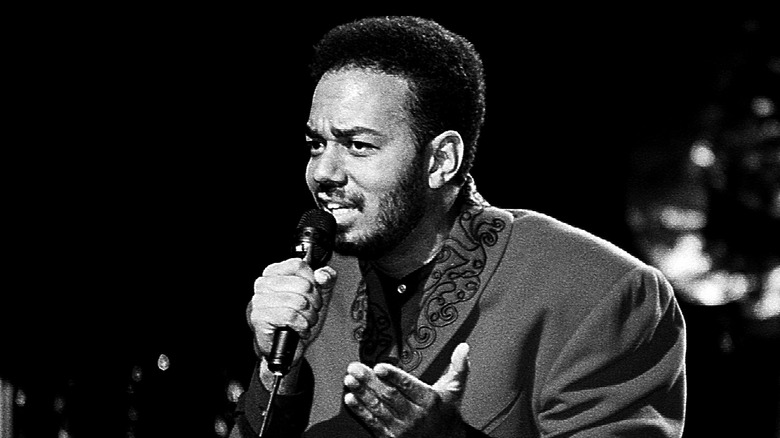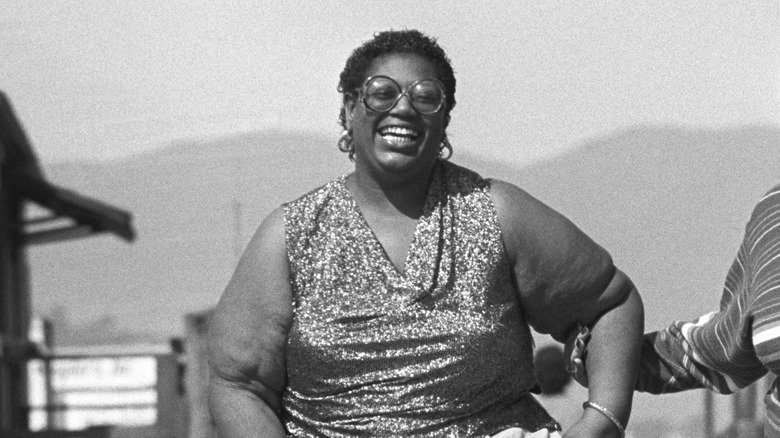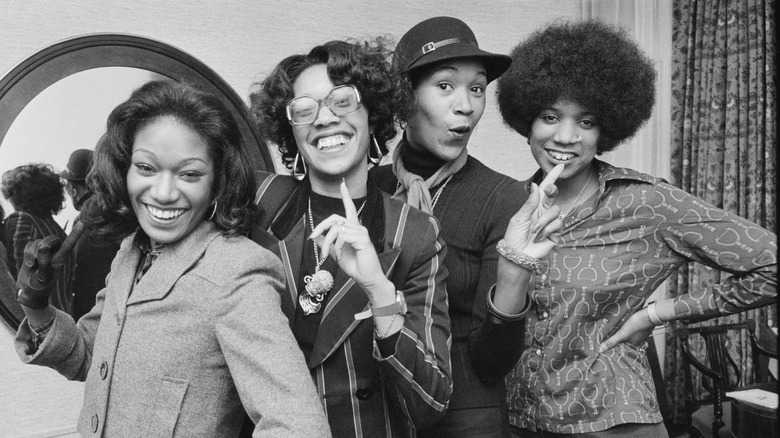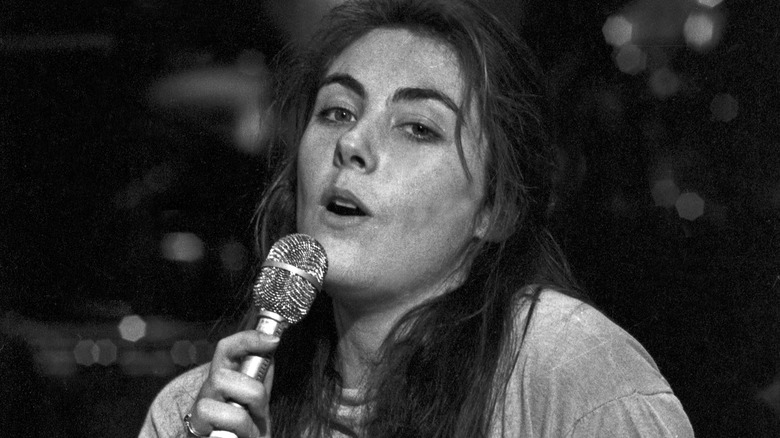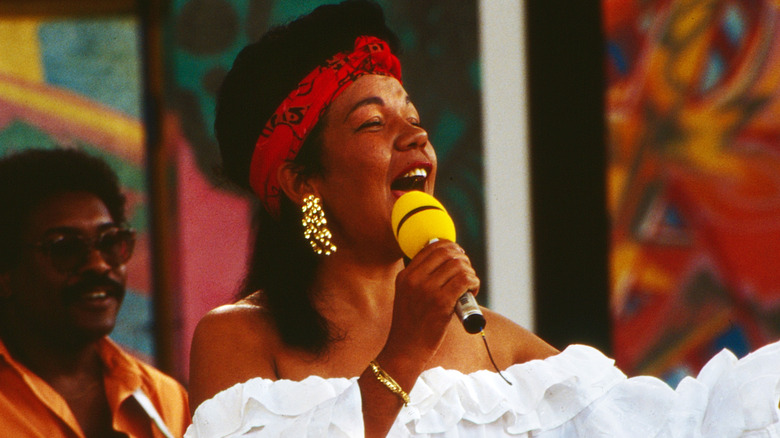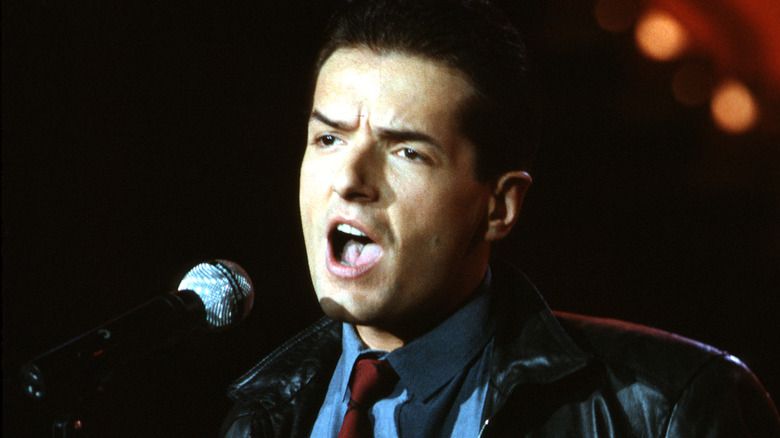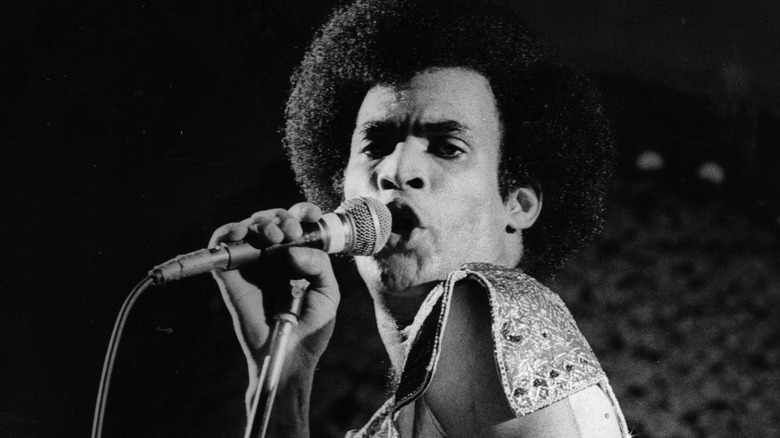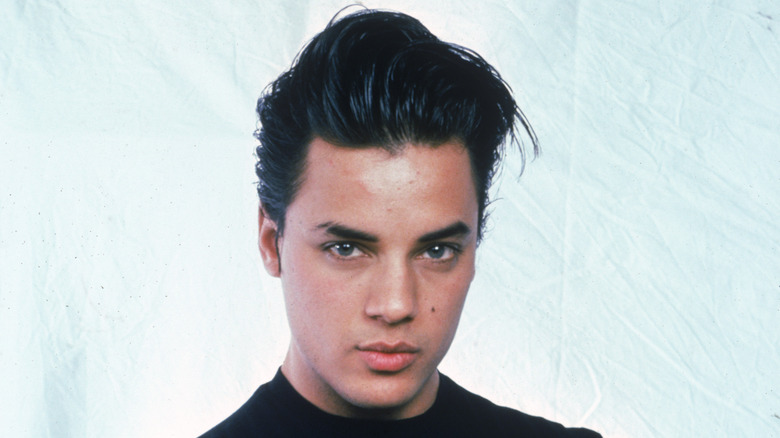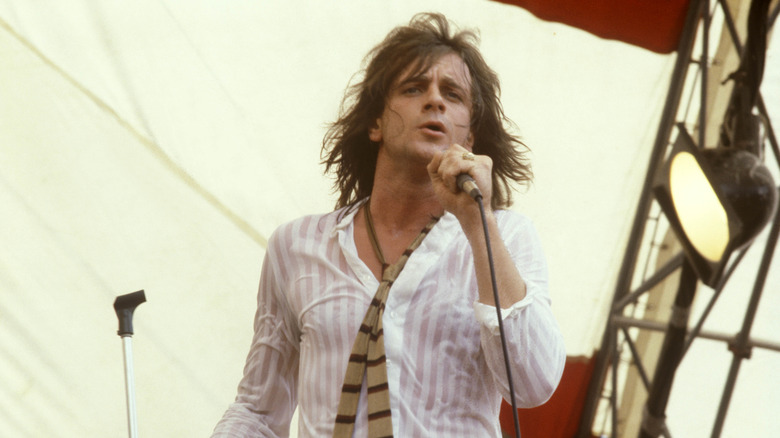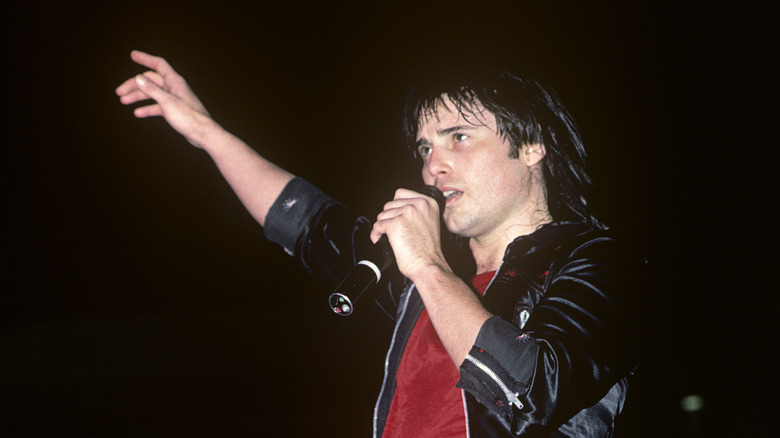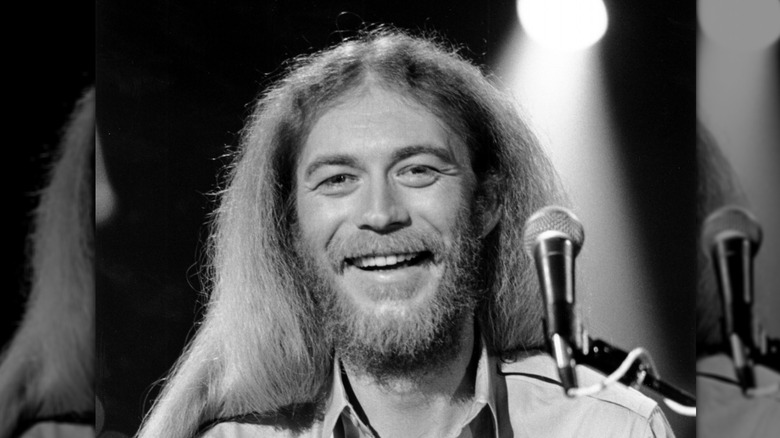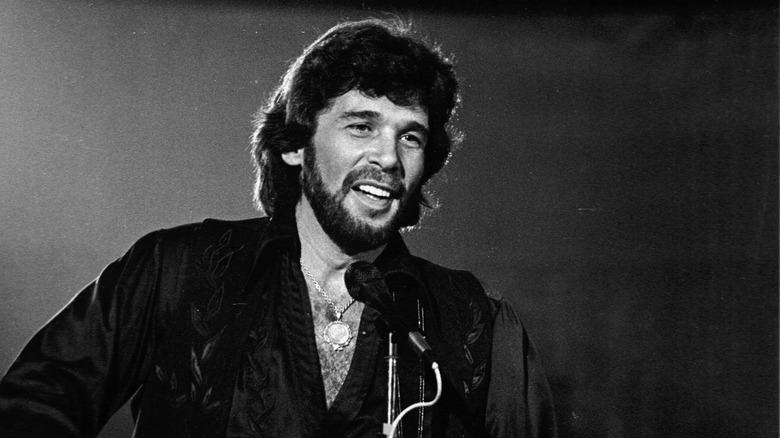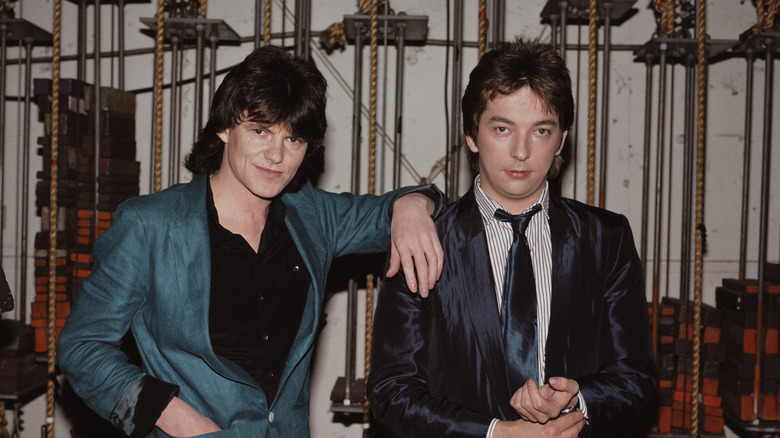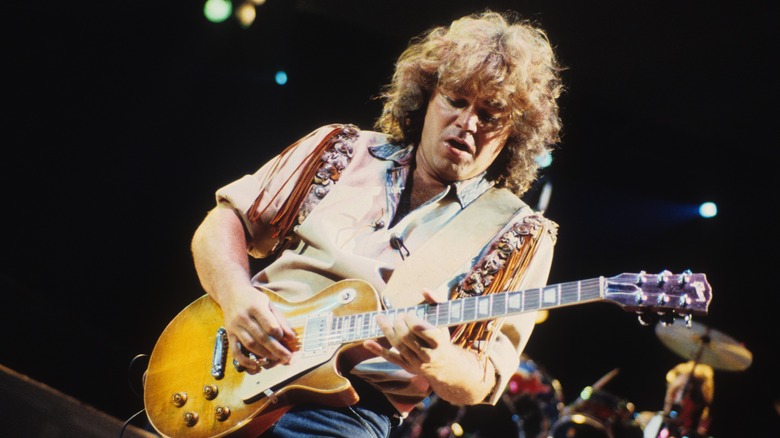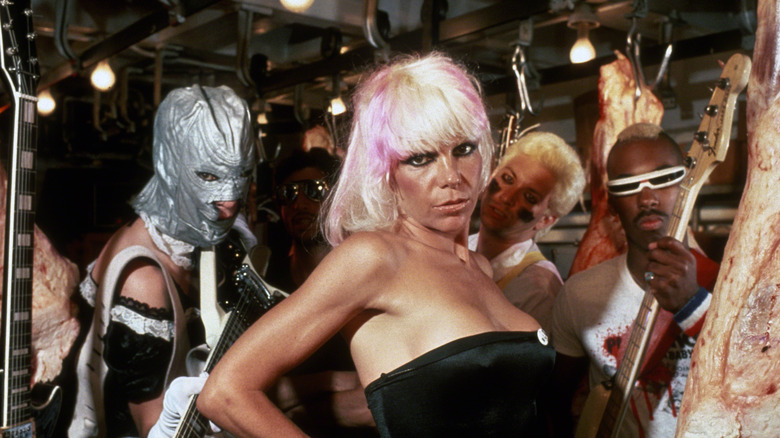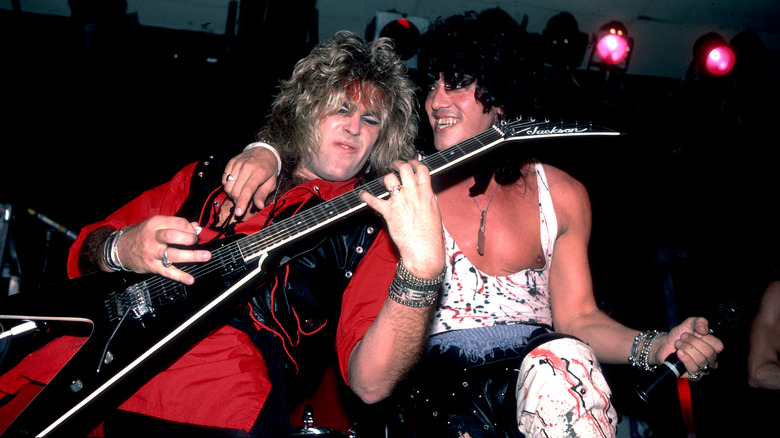Forgotten '80s Musicians You Didn't Know Passed Away
Correction 11/28/23: A previous version of this story stated that Jimi Jamison passed away due to a heart attack. Jamison died after suffering a stroke, not a heart attack.
The 1980s bid adieu to disco fever and saw the masses gravitating to the sweet (and sometimes overstuffed) stylings of the synthesizer. The decade also saw the rise of new musical sounds: hair metal, new wave, and even hip-hop were popular, offering listeners a variety of different genres to gravitate to. If that's not all, 1981 saw the birth of MTV, a historic moment in music, which ultimately changed the industry forever, becoming the leader of "pop culture and entertainment" in North America, and eventually, the world.
As the decades went on, when some of the most beloved '80s icons died, the world wept. When David Bowie died in 2016, fans around the globe erected impromptu shrines in his honor, while fellow contemporary musical heavyweights, such as Kanye West, took to social media to pay their respects.
But what about the '80s stars that have been buried by time? At one point, '80s hitmakers all had their own distinct sounds. "You'd hear something and think, oh that's Bananarama, that's Culture Club, that's Duran Duran," reflected Keren Woodward of Bananarama to the BBC, adding, "everyone looked their own way as well." It turns out, there have been a lot of forgotten musicians from the 1980s that you may not know have passed away.
Pete Burns
Pete Burns, frontman of new wave group Dead or Alive, died in October 2016, the cause reported in a since-deleted X (formerly known as Twitter) statement as "massive cardiac arrest," per The New York Times. The band formed in the late '70s, although it wasn't until their 1984 single, "You Spin Me Round (Like a Record)," that they really gained worldwide recognition. The New York Times revealed that the track reached the 11th spot on the Billboard Hot 100 in the U.S., while in their native U.K., it took its place on the No. 1 throne.
While Dead or Alive still continued to make music well into the 2000s, Burns started to become more known for his rapidly changing looks that came by way of extensive plastic surgery. The singer's androgynous look saw his fans praise him for his progressive approach to gender. As he declared to The Guardian in 2007, "Everyone's in drag of some sorts," adding, "I was brought up with an incredible amount of freedom and creativity. Society has put certain constraints on things."
After Burns' death, many of his fellow '80s icons took to social media to pay tribute, such as Marc Almond of Soft Cell, who posted on X (formerly known as Twitter), "We've had some mad times with Pete but he was a one-off creation, a fabulous fantastic brilliant creature." Interestingly enough, even Boy George, who Burns once accused of copying his look, also paid his respects on Instagram, writing, "We had our wars, but I admired him!"
James Ingram
On January 29th, 2019, actor Debbie Allen took to X (formerly known as Twitter) to announce the passing of her longtime friend and R&B legend, James Ingram. While she didn't mention any cause of death, gossip rag TMZ revealed that same day that Ingram's death at age 66 was due to brain cancer. It marked the end of an industry icon: Ingram has won two Grammys in his career and was nominated 14 times, even stepping out of his comfort zone and collaborating with his musical peers of different genres, such as country queen Dolly Parton and pop star Linda Ronstadt.
Ingram had an interesting start in the industry, moving to Los Angeles from Akron, Ohio, with his band, Revelation Funk. As he told the Chicago Tribune in 2012, while his bandmates were the better vocalists, it was his dedication that he really credits his success to. It turns out, after two years, Revelation Funk headed back to Ohio while Ingram stuck it out, snagging backup jobs singing for Ray Charles and Marvin Gaye. From there, he caught the eye (or ear) of Quincy Jones, and the rest, as they say, was history.
Although he collaborated with so many musical icons, Ingram recalled one incredible story to the Chicago Tribune, when Jones tasked him to write Michael Jackson's mega-hit, "P.Y.T." After working in the studio with both Jones and Jackson, he remembered the King of Pop asking him if he was "singing [the song] right." Ingram simply told Jackson, "Man you're killing it."
Izora Armstead
In September 2004, the death of Izora Armstead, one half of the '80s duo the Weather Girls, was announced. Responsible for "It's Raining Men," one of the biggest club anthems of the decade, Armstead died of heart failure, her age "unknown," although many believe she was born in 1942.
Armstead and her musical partner, Martha Wash, formed Weather Girls (then called NOW — an acronym for News of the World) in the mid-70s and began their rise to the A-list singing backup vocals for Sylvester. Since the pair were so popular on the club circuit and on television, NOW changed their name to Two Tons O' Fun — an "obvious reference to their voluptuousness" (via Independent). It wasn't until they released their now-iconic song in 1983 that they really started to leave their mark as '80s legends. In a '90s interview with MTV3, Armstead revealed that the duo changed their name to the Weather Girls because of the opening line in "It's Raining Men." She quipped, "It stuck, so I hurried up and patented the name."
But besides dominating the '80s club charts, Armstead is also remembered for the powerful message she wanted to leave the music industry with. "Our audiences expect our music to be gay and positive," she once reflected, according to the Independent. "Reality for many people is grim and depressing and, for this reason, we want to pass on our energy and drive and to bring pleasure through our music."
Kevin DuBrow
Lead singer Kevin DuBrow was a part of glam metal band Quiet Riot since its inception in the '70s. While the group was able to garner a crowd during live shows, they didn't land their first record deal until the end of the decade, and it wasn't until 1983's "Metal Health" album that they really gained worldwide recognition. According to the band's website, Quiet Riot left their mark by becoming "the first heavy metal band to top the [Billboard] pop chart," coming in at No. 1 with the album — all thanks to their Slade cover of "Cum on Feel the Noize."
"Quiet Riot [was] the first real MTV rock band," mused Blackie Lawless, singer of metal band WASP, to the Los Angeles Times. "When people write rock 'n' roll encyclopedias ... L.A. will have its own '82-'83 chapter, and Quiet Riot would really be the beginning of that chapter." Sure enough, Quiet Riot would continue to make music throughout the decades to come, so it, of course, came as a big shock when the world found out that DuBrow suddenly died in November 2007.
According to the Los Angeles Times, the singer's death was ruled "an accidental cocaine overdose." He was 52. As it turned out, DuBrow had recently broken up with his girlfriend of over seven years, Lark Williams, who was equally shocked by the rocker's death. "He was as strong as an ox, that boy," Williams noted to the Los Angeles Times, adding that he "never looked better."
If you or anyone you know needs help with addiction issues, help is available. Visit the Substance Abuse and Mental Health Services Administration website or contact SAMHSA's National Helpline at 1-800-662-HELP (4357).
June and Bonnie Pointer
The Pointer Sisters had a storied career that spanned a remarkable five decades — all while refusing to place themselves in the confines of one musical genre. While the music industry officially labeled the band as an R&B group, the Pointer Sisters recorded top-selling songs in a plethora of different genres: from pop, electro, jazz, and even country. "People kept saying, 'You gotta pick a category,'" recalled Ruth Pointer to Fader. "Why? Why do you have to do that? It wasn't something we felt we had to do," she mused. Sure enough, the band didn't have to, going on to win three Grammy awards.
Originally formed in the late 60s by sisters June and Bonnie Pointer, their other two siblings, Anita and Ruth, joined the group in 1972 and released their debut album the following year. By the time the '80s rolled around, the quartet released 1983's "Break Out" — subsequently going triple-platinum. Sadly, in the following decade, the sisters all decided to experiment with solo efforts, none of which reached the same level of fame.
In April 2006, the youngest Pointer sibling, June, died of cancer at the age of 52. Fourteen years later, in June 2020, the other founding member, Bonnie, went into cardiac arrest and sadly died, per TMZ. According to the death certificate obtained by the tabloid, the singer allegedly had "other underlying issues ... including liver disease."
Greg Ham
Although they only enjoyed global, A-list success for a mere three years, Men at Work released some of the most memorable songs of the 1980s. According to AllMusic, the Aussie band released their debut album, "Business as Usual," in November 1981, and by the following year, achieved international fame, even "breaking the American record for the most weeks a debut spent at the top of the charts." Men at Work are perhaps remembered best for their song, "Down Under," which many consider the "unofficial anthem for Australia," per The Washington Post.
Much of the band's success wouldn't have happened without Greg Ham, who played the saxophone and flute in the group and was responsible for that riff in "Down Under." Unfortunately, Ham and the rest of the band ran into a rough snag in 2010 — years after they disbanded — when they were accused of stealing the riff of "Down Under" from a children's campfire song "Kookaburra Sits in the Old Gum Tree." According to The Guardian, they were ultimately ordered to pay "5% of the song's royalties," but the news absolutely "devastated" Ham, with a friend revealing to The Washington Post that he was never "the same" after the court ruling.
According to The Washington Post, Ham was found dead on April 19, 2012. It was later revealed the cause was a heart attack.
Laura Branigan
Laura Branigan saw immediate success with her 1982 debut album, "Branigan," which featured one of the most enduring pop songs of the decade: "Gloria." The single skyrocketed to the No. 2 spot on Billboard's Hot 100 and sat pretty on the chart for an impressive 36 weeks. But Branigan was already building her career before then. In the latter portion of the 70s, she won an audition to become a backing vocalist for Leonard Cohen and toured with him until the end of the decade, subsequently landing her own record deal with Atlantic.
The singer perhaps would have even endured longer success if it wasn't for her husband's cancer diagnosis in the '90s, causing her to ultimately retire her microphone in 1994. "That's what I lived for," she told CNN in 2002 of quitting her career to look after her beau. "It was not even a choice." Sadly, Branigan's husband died a mere two years later, leaving her overcome with grief and unable to return to music.
In the early 2000s, Branigan finally went back into the recording studio, yet tragically, she never got a chance to revive her once-flourishing career. In August 2004, the singer complained of a headache for two weeks, resulting in her death from a brain aneurysm on August 26th. As the outlet notes, she was in the process of recording new material.
Loalwa Braz
It didn't take long for French-Brazilian band Kaoma to reach global success. Known for their 1989 sultry hit, "Lambada," The New York Times reported that by 1990, Kaoma had sold "five million single records and two million albums with the song" across the globe. But "Lambada" didn't come without its own controversies for the international group. As the outlet revealed, two Bolivian brothers, Gonzalo and Ulises Hermosa sued Kaoma for using the melody of their own song, ”Llorando Se Fue,” without crediting them. Of course, the Hermosa brothers won the suit, with 50 percent of the track's royalties going to EMI, the company that owned the song rights.
To this day, "Lambada" is still widely recognized as Kaoma's song, with the sensual vocals belonging to Brazilian singer Loalwa Braz. Braz even moved to Paris after the song's success, where she remained for ten years as she recorded and toured with the band. When she finally returned to Rio de Janeiro, Braz still performed her hit during live concerts and events, yet, sadly, her life was cut short at the age of 63.
Braz was found dead in a burnt car in January 2017 near her house in Saquarema. Although the news site initially noted that the cause of death was still unknown, it was later revealed that she was targeted by "thieves," in what Brazilian news site Globo dubbed "a robbery gone awry" (via Billboard).
Falco
While the name Johann "Hans" Hölzel may not mean much to some, Austrian rap icon Falco may ring a few bells — thanks to his international 1986 hit, "Rock Me Amadeus." Falco may very well be the second most recognizable musician out of Austria since his song's namesake, Wolfgang Amadeus Mozart, and they're not wrong. Falco became the first Austrian to shoot to the top of Billboard's pop chart and, somewhat surprisingly, was the first rap artist to have a No. 1 pop song on the American chart.
Although some may be quick to brush off Falco as a one-hit-wonder, the musician actually did continue to make more music, hovering near the top of the German and Austrian charts well into the 1990s, yet his success in America would never quite reach the same heights as it did with "Rock Me Amadeus." In the late '90s, Falco moved to the Dominican Republic and began building his own recording studio, yet tragically, never got to see the final product. In February 1998, he died in Puerto Plata when a bus struck his car.
In Falco's native Austria, on the other hand, his death made waves. As musician Thomas Lang told the Independent, Falco will forever be remembered "not as the biggest Austrian pop star but as the only Austrian pop star."
Bobby Farrell
Boney M are pretty much synonymous with the '70s disco era. The band, which was fronted by Bobby Farrell, are probably best known for their hits such as "Rivers of Babylon," "Daddy Cool," and "Rasputin," the latter of which saw a sudden resurgence in 2021 thanks to a viral TikTok dance trend. Farrell, who actually lip-synched on stage in place of Frank Farian (who assembled the band), remained with the group until 1981, until he was fired by Farian himself.
Although Farrell tried going solo after getting the boot from Boney M, he wasn't successful and eventually fell on hard times in his home in the Netherlands, living on welfare and even "[spending] a few weeks in prison," per the Independent. By the time the 2000s came around, Farrell had landed on his feet and was performing yet again, this time re-recording the biggest hits of his heyday.
The former Boney M frontman was found dead in St Petersburg, Russia, in his hotel room, after a performance. He was 61. It was later revealed that he died from heart disease. In a bizarre coincidence, Farrell died on December 30th — the same day and in the same city as Grigori Rasputin, advisor to Tsar Nicholas II and the subject of one of Boney M's most iconic hits.
Marie Fredriksson
Roxette, a Swedish duo made up of Per Gessle and Marie Fredriksson, had a very bizarre rise to international fame. The bandmates met in the late '70s, ultimately forming Roxette in 1986, and subsequently reaching success in their home country with their single, "Neverending Love."
Now, this is where the story gets interesting. After an American exchange student, who was studying in Sweden, bought the band's second album, "Look Sharp!," he brought it home to Minneapolis, Minnesota, where he took it to local radio station KDWB 101.3 FM. From there, the station began playing "The Look," a single off of the album, which ultimately became a national hit, peaking at No. 1 on Billboard's Hot 100 chart. Roxette went on to enjoy other hits in the U.S., such as 1988's "Listen to Your Heart," and continued touring and making music through 2016.
Sadly, after battling cancer for 17 years, Fredriksson died of a brain tumor in 2019 at the age of 61. Gessle issued a statement on X (formerly known as Twitter), writing, in part, "...I'm honored to have met your talent+generosity. All my love goes to you+your family. Things will never be the same."
Mark Hollis
British band Talk Talk were amongst some of the most influential acts of the 1980s. Although they're often associated with some of their new wave hits, such as 1984's "It's My Life," it's actually their later endeavors into post-rock that some modern-day acts say they were inspired by. Matthew Good told "ExploreMusic" that some of his "favorite piano sounds" come from those "latter" albums, while Radiohead's Philip Selway had high praise for Talk Talk's 1988 album, "Spirit of Eden."
It's actually that 1988 record that may be lead singer/songwriter Mark Hollis' magnum opus. According to a 2008 article by The Guardian, "Spirit of Eden" remarkably "has not dated," with the outlet noting how "contemporary it sounds." Hollis was also known for his refusal to conform to his label's desires: per The Guardian, when EMI tried to change the band's image and the way they spoke to reporters, the singer refused — gaining a bit of a reputation as being a "surly, self-obsessed character."
Hollis ended up leaving EMI and, eventually, Talk Talk, as well (via The Guardian). In February 2019, BBC reported that the songwriter had died, his manager, Keith Aspden, confirming that it was from "a short illness from which he never recovered." He was 64. Talk Talk's bassist Paul Webb, aka Rustin Man, posted a tribute to his old bandmate on Instagram, writing, in part, "He was one of the greats, if not the greatest."
Irene Cara
Irene Cara would have had an enviable career as the star of stage and screen had she never even attempted a pop music career. She debuted on Broadway in 1967 at the tender age of 8, in the musical "Maggie Flynn"; off-Broadway, television and feature roles followed throughout the '70s, including the childrens' series "The Electric Company" and the 1976 film "Sparkle."
In 1980, she starred in the feature film "Fame," leading that Oscar-winning drama's ensemble cast and singing its theme song, which collected one of those statues. She followed that success in 1982 with her debut solo album "Anyone Can See," which had previously yielded the 1980 top 20 single in "Out Here On My Own" — but the best was yet to come. In 1982, she was tapped to co-write and perform the title track to the movie "Flashdance," which scored yet another Oscar and shot to No. 1 on the pop chart.
Unfortunately, her career was hindered by allegedly shady business practices on the part of her label. In 1985, she filed a lawsuit against Network Records, claiming that she had been bilked out of royalties from the "Flashdance" soundtrack and her first two albums; she received a $1.5 million settlement in 1991, but later complained to People that she had been "virtually blacklisted" as a result of the suit (via The New York Times). In recent years, Cara attempted a 2011 comeback with her group Hot Caramel, but the project went nowhere; Cara died in 2022 from heart disease.
Nick Kamen
Nick Kamen was always going to be some kind of star; on top of such intangibles as magnetism and charisma, which he had in spades, he was simply impossibly good-looking. A model, the Englishman appeared in the famous 1985 Levi's ad that had him stripping down to his boxers in a laundromat while Marvin Gaye's version of "I Heard It Through the Grapevine" played in the background; by one metric, this caused sales of Levi jeans to shoot up by 800 percent.
Kamen also had a pretty good singing voice — and since he happened to be hanging around New York in the '80s, he inevitably got noticed by Madonna, who promptly forked over to him a song she had been planning to record, "Each Time You Break My Heart." Just to be a pal, she also provided backing vocals on the track — which, of course, promptly sailed to No. 5 on the U.S. charts, and the same spot in the U.K.
However, Kamen's prior exposure as a model in a famous ad didn't bode well for his longevity as a pop artist. Despite notching a couple more hits in the U.K. and Italy (once again with an assist from Madonna), his pop fortunes soon faded, but this didn't seem to bother him. He spent his later years painting, practicing Buddhism, occasionally modeling, and hanging out with his significant other, Lucinda Cary. In 2021, after dealing with cancer for three years, Kamen died at 59.
Tony Lewis
In a crowded field of '80s rockers, The Outfield stood out for several reasons. A trio of British boys who nevertheless chose a name associated with American baseball (they had even previously been dubbed the Baseball Boys), the band eschewed the popular hair metal style of the day in favor of straight-ahead pop-tinged rock.
Thanks to their well-defined sound and the distinctive tenor of bassist and lead singer Tony Lewis, The Outfield scored big with their debut LP, 1985's "Play Deep," which yielded a pair of top 20 singles, including the No. 6 hit "Your Love," which gets plenty of play on classic rock radio stations to this day. The band had surprising longevity, charting a total of eight Hot 100 singles through 1992, and they continued to record and perform until the death of guitarist-keyboardist John Spinks, who died in 2014 from liver cancer.
Lewis soldiered on, releasing a solo album in 2018 and an EP featuring an all-acoustic set in 2020 — but unfortunately, that would be his last hurrah. In October of that year, it was announced that the singer had "suddenly and unexpectedly" died at the age of 62; no cause of death was given. Lewis was eulogized by his official X (formerly known as Twitter) account in a moving post which read in part, "He was a beautiful soul who touched so many lives with his love, his spirit, and his music. He loved his fans dearly and enjoyed every opportunity he had when meeting all of you."
Eddie Money
The definition of a blue-collar rocker, Eddie Money didn't exactly look or sound like the quintessential rock star — but what he lacked in blazing good looks and vocal chops, he more than made up for in pure heart and charisma. He first made a splash in the late '70s with the hits "Baby Hold On" and "Two Tickets to Paradise," before courting major stardom with a pair of tunes in the early MTV era: "Think I'm in Love," a No. 16 hit, and "Shakin'," which — while only reaching No. 63 on the chart — boasted a wildly popular video featuring Apollonia Kotero, who would go on to co-star with Prince in the 1984 classic "Purple Rain."
Money would really cash in later in the decade, fielding the No. 4 smash "Take Me Home Tonight" (featuring legendary vocalist Ronnie Spector) in 1986, and the No. 9 hit "Walk on Water" in 1988. All told, he landed no fewer than 23 tunes in the Hot 100 during his career, and according to his website, he sold a whopping 28 million records.
In 2018, Money and his family participated in the AXS TV reality show "Real Money," which often chronicled the health struggles that would eventually become too much for the star. Money died in 2019 at the age of 70, and in a statement, AXS TV founder Mark Cuban eloquently paid tribute, writing: "He will be missed immensely by all of those who knew and loved him. But, if we know Eddie, he's rocking right now in heaven, doing what he always loved."
John Wetton
Bassist, vocalist, and songwriter John Wetton first made his mark as a member of '60s and '70s prog-rock outfit King Crimson, notching three albums with that band before its dissolution in 1974. Wetton then floated around to a few other bands, including the venerable outfits Roxy Music and Uriah Heep, before landing on a different concept — a return to his roots of sorts, a progressive rock supergroup featuring peers that had played with titans of the genre.
Wetton convened drummer Carl Palmer of Emerson, Lake, and Palmer, guitarist Steve Howe of Yes, and keyboardist Geoff Downes of the Buggles to form Asia — a prog-rock juggernaut that, strangely enough, would yield his sole brush with mainstream success. While the band certainly got proggy during stretches of its 1982 self-titled debut LP, it also got poppy enough to yield a pair of massive hits — the No. 4 smash "Heat of the Moment" and "Only Time Will Tell," which reached No. 17.
The band's follow-up, 1983's "Alpha," produced the No. 10 rocker "Don't Cry" — but after one more album, Wetton departed to take a long hiatus, before reuniting with the band in 2008. He continued to record and perform with them, and was scheduled to embark on a U.S. tour in 2017 — but it was not to be. He died from colon cancer in January of that year; in 2023, many of his prog-rock peers, including Downes and his Yes bandmate Rick Wakeman, participated in an all-star concert in his honor.
Colonel Abrams
Detroit vocalist Colonel Abrams, which was indeed his real name, had a brush with mega-fame before becoming a star of dance and early house music in the '80s. The decade prior, he and his brother Morris were doing time in a soul group called Conservative Manor, which made some noise after a well-received performance at the Apollo Theater. Abrams went on to sing for 94 East, which featured a then-unknown musician with another title for a first name: Prince.
Unfortunately, the band soon went their separate ways, and Abrams embarked on a solo career. In an Associated Press interview in 1986, he lamented the situation, saying, "I just look at that whole situation and shake my head. 'Cause when I first met Prince, I said, 'This guy's going to be great.' The group was definitely tight" (via Philly Tribune).
Abrams made his mark in the world of dance music by combining Motown-style R&B with the more hard-edged sounds of the rap music coming out of New York, his adopted city. He scored a hit on the international dance charts with "Music is the Answer" in 1984, earning him a major-label deal that yielded more dance floor classics, including "I'm Not Gonna Let You," "How Soon We Forget," and his biggest hit, "Trapped." Unfortunately, his later years were marred by hardship, and he was unhoused and struggling with medical bills for years before his death in 2016.
Jimi Jamison
It's easy to forget that Chicago rockers Survivor were far from a one-hit wonder — but when your introduction to the national audience is a tune as indelible as "Eye of the Tiger," you take the bad with the good. That song, from the "Rocky III" soundtrack, spent six weeks at No. 1 on the pop chart and made instant stars of the band — but they went on to arguably greater success afterward, scoring no fewer than four top 10 singles in 1985 and 1986. It's also easy to forget that not long after "Eye of the Tiger" went nuclear, the band shed lead singer Dave Bickler in favor of a new voice — Jimi Jamison, who had previously fronted the band Cobra and sang backing vocals for the likes of Joe Walsh and ZZ Top.
Jamison sang lead on all of Survivor's successive hits, including "High On You," "Is This Love," "The Search is Over," and — from the "Rocky IV" soundtrack — the No. 2 hit "Burning Heart," perhaps his best performance. The band's commercial fortunes literally ended the moment the '80s did; they landed no fewer than 18 singles in the Hot 100 during the decade, with the last being "Across the Miles," which peaked at No. 74 in February 1989.
Survivor continued to perform together, and Jamison was in the studio and coming up with some new material when he died of a stroke in 2014; he was 63 years old.
Chrissy Amphlett
Australia's Divinyls took their native country by storm before coming to the U.S., but it took them a while to take off stateside. While their '80s output was marked by just one minor hit single — "Pleasure and Pain," which peaked at No. 76 in 1986 — the band were critical darlings, thanks in large part to the skills of guitarist and songwriter Mark McEntee and uber-charismatic lead singer Chrissy Amphlett. With just one Australian Top 10 single under their belt, 1981's "Boys in Town," the band landed a record deal with Chrysalis Records, releasing their debut LP "Desperate" in 1983.
Two more LP releases followed in the '80s, and while the band scored big with critics — in 2021, Rolling Stone Australia even put them at No. 18 on their list of 50 greatest Aussie artists of all time — they had a tough time getting their feet under them commercially, due to their tendency to keep losing managers, not to mention bandmates not named McEntee or Amphlett.
Their biggest hit came in 1990, with the risque No. 4 single "I Touch Myself" from their self-titled fourth album; the band slipped off the radar later in the '90s, and in 2010, Amphlett revealed that she had multiple sclerosis, which was complicating her treatment for breast cancer. "It's unfair, but life is not fair — even rock stars get breast cancer," she said at that time. "I'll get over it. I've got songs to sing, I've got stages to perform on." Sadly, that was not to be. Amphlett died due to complications from breast cancer in April 2013, at the age of 53.
Jani Lane
Warrant got in on the very tail end of hair metal's dominance in the '80s, but did they ever capitalize. Their debut album, "Dirty Rotten Filthy Stinking Rich," was released in 1989, going double platinum and notching three hit singles: "Down Boys," "Sometimes She Cries," and the smash power ballad "Heaven," which climbed all the way to No. 2.
Their success was due in large part to the talents of frontman Jani Lane, who possessed a voice made for his genre, and whose blond locks and good looks made him a natural fit for music videos at a time when MTV was still relevant. Warrant's second LP, "Cherry Pie," duplicated that success, spawning a pair of No. 10 hits, including the title track — but in the early '90s, grunge and alternative rock took over, and Warrant's fortunes declined swiftly along with the rest of their peers, although they continued to perform and record.
Lane departed Warrant in 1993, but returned for several stints with the band. In the interim, he dabbled in television and briefly joined his fellow hair metallers Great White for their 25th anniversary tour. Unfortunately, like many of his peers, Lane had publicly struggled with drug and alcohol misuse for years, and in August 2011, Lane was found dead of alcohol poisoning in a hotel in the Woodland Hills area of Los Angeles; he was only 47.
If you or anyone you know needs help with addiction issues, help is available. Visit the Substance Abuse and Mental Health Services Administration website or contact SAMHSA's National Helpline at 1-800-662-HELP (4357).
Teena Marie
Vocalist Teena Marie was a mainstay of the R&B charts in the '80s, and she had a voice that was made for the genre — a high and clear soprano capable of crooning, belting, and sliding up and down the scale with effortless ease. After spending years in development at Motown and briefly partnering with Rick James, Marie was still having trouble breaking through to the pop charts — which is why she took a course of action that may define her legacy to an even greater extent than her music.
Early in the '80s, Marie filed suit against Motown for nonpayment of royalties, and won — an outcome which resulted in a change to California law, which thereafter discouraged labels from keeping artists under exclusive contracts. Set free from Motown, Marie signed to Epic, where she finally enjoyed mainstream success with 1984's No. 4 hit "Lovergirl."
After continuing to notch R&B hits throughout the '80s, Marie took some time off to raise her daughter in the '90s, before returning to music with an unlikely partner: Cash Money Records, the rap label that was home to such artists as Birdman and Lil Wayne. Her first album for Cash Money, "La Doña," cracked the Top 10 on both the R&B and pop album charts, and one of its singles, I'm Still in Love," earned Marie her third Grammy nomination, making it a late-career highlight. Marie died in 2010 at the age of 54, due to natural causes.
Paul Davis
Paul Davis was an artist who was tough to put into a box; his voice was soulful, yet possessed of an unmistakable Southern twang, and with his penchant for smooth keyboards and balladry, it wouldn't be out of line to classify his breakthrough single as yacht rock. That single: 1977's "I Go Crazy," a No. 7 hit that set a record by remaining on the chart for a startling 40 weeks. That record has since been eclipsed many times over, and Davis went on to even bigger success in the '80s, scoring the hits "'65 Love Affair" and "Cool Night" early in the decade.
The next few years saw Davis pivoting to country, scoring hits via duets with Marie Osmond and Tanya Tucker. But as his career was starting to cool off, Davis was shot during an attempted robbery, prompting him to step away from public life and concentrate on songwriting in his home studio.
In the '00s, he was working on new stuff and mulling over a return to recording — but it was not to be. In April 2008, Davis suffered a heart attack and died in the hospital in his hometown of Meridian, Mississippi; it was the day after his 60th birthday.
Robert Palmer
Blue-eyed soul singer Robert Palmer has been described more than once as pop music's answer to James Bond, and the descriptor could not be more fitting. Suave and smooth, and usually favoring rather formal attire, his very British manner and good looks had a way of obscuring his singularly amazing voice, just as capable of astonishing power as it was a seductive croon.
While he scored a few respectable hits in the '70s, including 1979's classic top 20 hit "Bad Case of Loving You (Doctor, Doctor)," he became a massive star with his 1985 LP "Riptide" and its pair of ginormous hits, both propelled by iconic music videos: "Addicted to Love," which spent two weeks at No.1, and "I Didn't Mean to Turn You On," a Jimmy Jam (aka James Harris III) and Terry Lewis-penned gem that peaked at No. 2.
Even as these tunes were climbing the charts, Palmer joined supergroup Power Station, named after the legendary recording studio, featuring Chic powerhouse Tony Thompson on drums and John and Andy Taylor (no relation) of Duran Duran on bass and lead guitar, respectively. That group also managed a pair of top 10 singles: "Some Like It Hot" and the T. Rex cover "Get It On (Bang a Gong)," and Palmer kept the hit train rolling with "Simply Irresistible," which peaked at No. 2 in 1988. While his commercial fortunes waned after the '80s, Palmer continued to record up until the end of his life, which came far too soon. In 2003, he suffered a fatal heart attack; he was only 54.
Paul Young
While playing bass for Genesis, Mike Rutherford took a bit of time to put together a new outfit, Mike and the Mechanics. Rutherford's outfit — led by vocalists Paul Young, formerly of Sad Cafe, and Paul Carrack — sold 10 million LPs in its own right, and scored a slew of top 10 hits, including "All I Need is a Miracle," featuring a lead vocal by Young, which peaked at No. 5.
Young's rocking approach was a nice counterbalance to Carrack's more soulful croon, and the two frontmen shared their space together comfortably — but the configuration would not last forever. In 2000, Young died of a heart attack at the young age of 53, and Carrack departed the band in the mid-'00s. While Mike and the Mechanics would soldier on with replacement vocalists Andrew Roachford and Tim Howar, they never again approached the mainstream success they had enjoyed during Young and Carrack's tenure.
Eddie Rabbitt
Eddie Rabbitt made quite the name for himself as a songwriter before finding success as a solo artist; signing with a Nashville publisher in 1968, he wrote or co-wrote tunes that made waves for the likes of Elvis Presley and Ronnie Milsap, parlaying that success into a recording contract in the mid-'70s. Rabbitt enjoyed moderate success on the country charts in the latter half of that decade, but as the '80s dawned, a funny thing happened: Mainstream audiences began to take notice of his distinctive voice, and with his disciplined, pop-informed songwriting, he became one of a few country artists to score massive crossover hits early in the new decade.
A pair of singles from Rabbitt's 1980 LP "Horizon" simply lit up the charts: "Drivin' My Life Away" peaked at No. 5 that fall, and its follow-up "I Love a Rainy Night" fared even better, spending two weeks at No. 1 in early 1981. Rabbitt continued rolling with his next LP "Step By Step," scoring another No. 5 with the title track, and he lodged another top 10 song with "You and I," a duet with Crystal Gayle — but that would mark the end of his streak of pop stardom.
A few more tunes cracked the country charts in the late '80s and early '90s, but within a few years, Rabbitt was diagnosed with the lung cancer that would eventually take his life. After treatments, including surgery to remove part of a lung in 1997, Rabbitt died in May 1998; he was 56.
Rob Fisher
The impact of British duo Naked Eyes on the pop chart was brief, but anyone who was around during the salad days of MTV in the early '80s likely remembers them well, and fondly. Composed of vocalist Pete Byrne and keyboardist Rob Fisher, the pair's 1983 self-titled debut in the U.S. cracked the top 40 on the album charts, and yielded a pair of singles that get plenty of play on radio stations of a certain stripe to this day: "Always Something There to Remind Me," a No. 8 hit co-written by the legendary Burt Bacharach, and "Promises, Promises," a funky, dancy number that peaked at No. 11.
Unfortunately, the band simply had no luck following up that success. Their sophomore LP, 1984's "Fuel for the Fire," struggled to No. 84 on the album charts, with its lead single "(What) In the Name of Love)" just cracking the top 40; the release would prove to be the band's last. Fisher went on to form another duo, Climie Fisher, with vocalist Simon Climie, but that project went nowhere, and after contributing keys to tunes by artists such as Rick Astley and Jules Shear, Fisher was ready to take another crack at working with his old pal Byrne. Unfortunately, though, that would never come to fruition; after years of serious illness, Fisher died in 1999, following complications during a surgery. He was 42 years old.
Gary Richrath
Rockers REO Speedwagon were active throughout the '70s, but despite notching respectable album sales, they failed to have any significant success with their singles — until the '80s, when the floodgates opened. Behind the talents of frontman Kevin Cronin and guitarist Gary Richrath, the Speedwagon finally broke through with their 1980 LP "Hi Infidelity," which gave the band a No. 1 smash with "Keep On Loving You." Throughout the decade, the band would notch a staggering 14 Hot 100 singles — including a second No. 1, 1985's "I Can't Fight This Feeling," which spent three weeks in the top spot.
After the '80s, the band largely cooled their heels, releasing a slew of compilations of their hits and batting down rumors of bad blood between Cronin and Richrath. Despite apparently clearing the air on that topic on a 2001 episode of the VH1 series "Behind the Music," Richrath departed the band by the time they fielded their next LP, 2007's "Find Your Own Way Home."
Richrath never returned to REO, but his legacy within its ranks is more than secure; he penned several of their biggest hits, including "Keep On Loving You" and "Take It On the Run," and Cronin himself stated flatly in a Chicago Sun-Times interview that the band owed their mainstream success to him. In 2015, Richrath died while being treated for an undisclosed illness; he was 65 years old.
Wendy O. Williams
There were punk rock acts, like The Clash; there were shock rock acts, like Alice Cooper, and then there was the Plasmatics. The band, led by frontwoman Wendy O. Williams, could have been described as either, but were actually something else entirely — purveyors of loud, destructive, gender-bending musical theater that were just as likely to drag chainsaws and sledgehammers onstage as they were drums and guitars.
Williams' stage presence was always provocative, often belligerent, and at times partially nude; throughout the band's '80s run, she was slapped with multiple obscenity charges, and the band was known to destroy not only their instruments but also television sets, consumer electronics, and even Cadillacs. The Plasmatics fielded several LPs with titles like "New Hope for the Wretched" and "Beyond the Valley of 1984," but their gonzo live shows were the band's focus — and they were so completely, consistently off the rails that on the one hand, they were banned from performing in Britain, and on the other, they sold out New York's legendary Palladium without a major record contract, something no other band had ever done.
In the late '80s, Williams continued with a solo project produced by Gene Simmons of KISS, one final Plasmatics record entitled "Maggots: The Record," and even a rap-themed album, before retiring in 1988. A decade later, at the home she shared with former manager and partner Rod Swenson, she died by suicide; Swenson indicated that she had long had difficulty adjusting to life outside of music, and that she had planned her death for some time (via Rolling Stone). Williams was 48 years old.
If you or someone you know is struggling or in crisis, help is available. Call or text 988 or chat 988lifeline.org
Robbin Crosby
The run of hard rockers Ratt was confined almost entirely to the '80s, but what a run it was. Behind the growl of frontman Stephen Pearcy and twin lead guitars Robbin Crosby and Warren DeMartini, the band followed up their self-released, self-titled debut by signing with Atlantic Records and dropping "Out of the Cellar," a triple-platinum smash that yielded the top 20 MTV hit "Round and Round." The band's audience was dedicated; while not matching the highs of "Out of the Cellar," three more albums released in the '80s also sold north of a million copies each.
Unfortunately, Crosby was privately dealing with serious health issues. While he hid it from the public for years, he disclosed during an interview with a Los Angeles radio station in 2001 that he had contracted HIV long ago, due to substance misuse during Ratt's heyday in the '80s. "I have full-blown AIDS," he said at that time. "Basically, it's killing me ... I've been in the hospital for eight straight months, and in and out for over seven years." In June 2002, Crosby died of complications from AIDS at the age of 42. Speaking with The San Diego Union-Tribune, Ratt's hometown newspaper, Crosby's brother-in-law Bill Decker said, "Fame was the worst thing that ever happened to Robbin, and it was his downfall ... the heroin got in the way, and the cocaine, and all the other stuff. At some point he just gave up."
If you or anyone you know needs help with addiction issues, help is available. Visit the Substance Abuse and Mental Health Services Administration website or contact SAMHSA's National Helpline at 1-800-662-HELP (4357).


